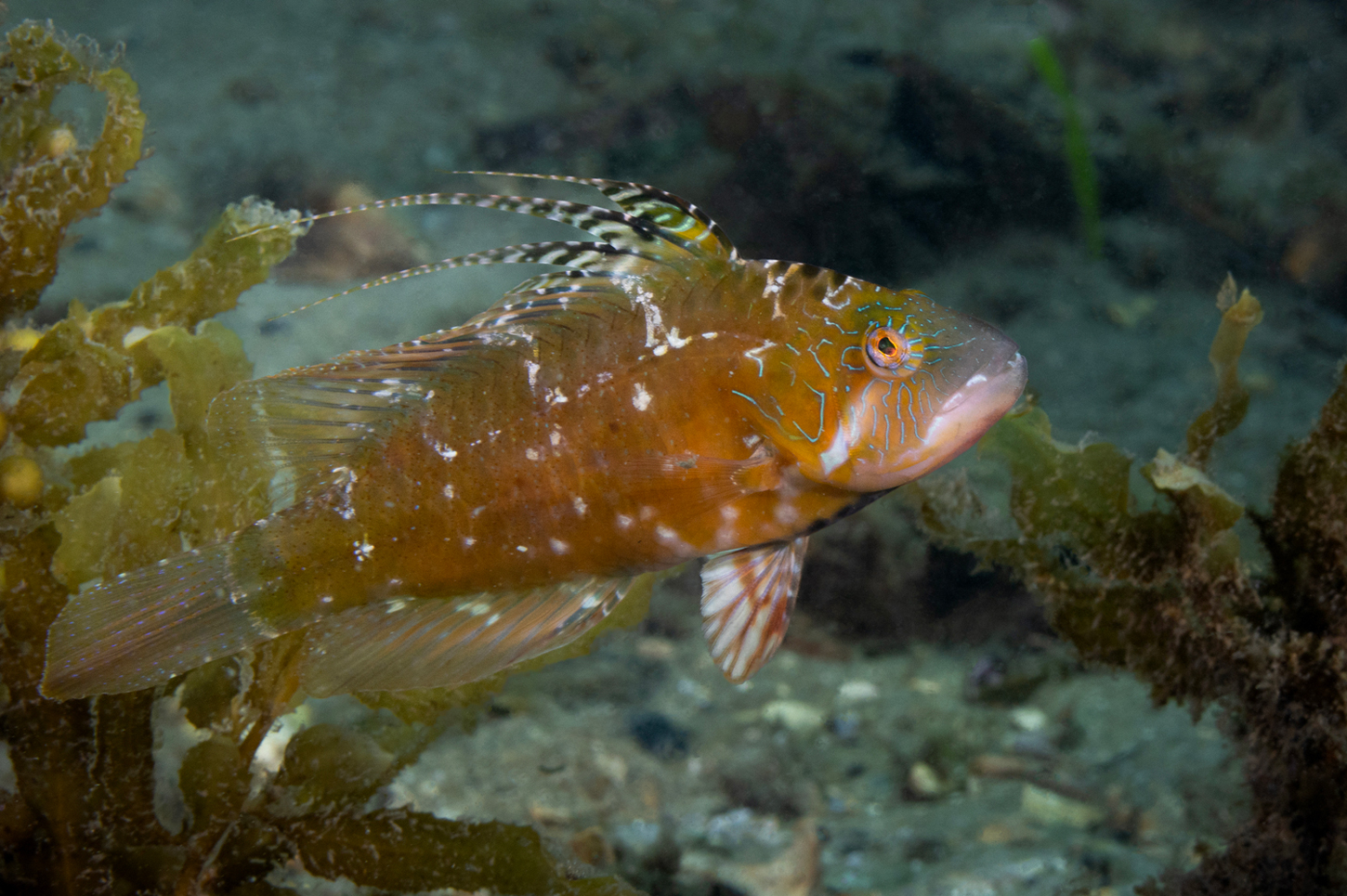- Classification
- ACTINOPTERYGII
- PERCIFORMES
- LABRIDAE
- Pteragogus
- flagellifer
Cocktail Wrasse, Pteragogus flagellifer (Valenciennes 1839)

A Cocktail Wrasse, Pteragogus flagellifer, in Swansea Channel, New South Wales, December 2023. Source: Matt Dowse / iNaturalist.org. License: CC by Attribution-NonCommercial
A well camouflaged yellowish to brown or reddish brown wrasse usually with spots, blotches and mottling. Juveniles have a blue blotch at the front of the dorsal fin, and males have long filamentous membranes at the front of the dorsal fin.
Video of a Cocktail Wrasse at the Gold Coast Seaway, Queensland, by Ian Banks.
Cocktail Wrasse, Pteragogus flagellifer (Valenciennes 1839)
More Info
|
Distribution |
Monte Bello Islands to the Bonaparte Archipelago, Western Australia, and the northern Great Barrier Reef, Queensland, to Swansea Channel, New South Wales. Elsewhere, the species is widespread in the Indo-West Pacific from the Red Sea to South Africa, east to Vanuatu, north to Taiwan and southern Japan. Inhabits coral and rocky reefs, among both hard and soft corals, patches of algae and weedy areas. |
|
Features |
Dorsal fin IX, 10-12; Anal fin III, 9; Gill rakers (total) 11; Lateral-line scales 22-25. Memebranes between anterior dorsal-fin spines of males produced into long filaments. |
|
Size |
Males to 20 cm TL, females to 15 cm TL. |
|
Conservation |
|
|
Etymology |
The specific name is from the Latin flagellum (= whip) and fero (= to bear), in reference to the prolonged filamentous tips on first two dorsal-fin spines of adults. |
|
Species Citation |
|
|
Author |
Bray, D.J. 2025 |
|
Resources |
Cocktail Wrasse, Pteragogus flagellifer (Valenciennes 1839)
References
Allen, G.R. & Erdmann, M.V. 2012. Reef fishes of the East Indies. Perth : Tropical Reef Research 3 vols, 1260 pp.
Allen, G.R. & Swainston, R. 1988. The Marine Fishes of North-Western Australia. A field guide for anglers and divers. Perth, WA : Western Australian Museum vi 201 pp., 70 pls.
Gloerfelt-Tarp, T. & Kailola, P.J. 2022. Trawled fishes of southern Indonesia and northwestern Australia. 2nd ed. i-vii, 1-422, Pls. 1-3. See ref online
Johnson, J.W. 2010. Fishes of the Moreton Bay Marine Park and adjacent continental shelf waters, Queensland, Australia. pp. 299-353 in Davie, P.J.F. & Phillips, J.A. Proceedings of the Thirteenth International Marine Biological Workshop, The Marine Fauna and Flora of Moreton Bay. Memoirs of the Queensland Museum 54(3)
Kuiter, R.H. 2010. Labridae fishes: wrasses. Seaford, Victoria, Australia : Aquatic Photographics pp. 398.
Sadovy, Y. & Pontillas, J. 2010. Pteragogus flagellifer. The IUCN Red List of Threatened Species 2010: e.T187684A8600071. https://dx.doi.org/10.2305/IUCN.UK.2010-4.RLTS.T187684A8600071.en. Accessed on 21 April 2022
Valenciennes, A. in Cuvier, G.L. & Valenciennes, A. 1839. Histoire Naturelle des Poissons. Paris : Levrault Vol. 13 505 pp. pls 369-388.
Westneat, M.W. 2001. Labridae. pp. 3381-3467 in Carpenter, K.E. & Niem, T.H. (eds). The Living Marine Resources of the Western Central Pacific. FAO Species Identification Guide for Fisheries Purposes. Rome : FAO Vol. 6 pp. 3381-4218.
Whitley, G.P. 1964. A survey of Australian Ichthyology. Proceedings of the Linnean Society of New South Wales 89(1): 11-127 (as Duymaeria flagellifera)





